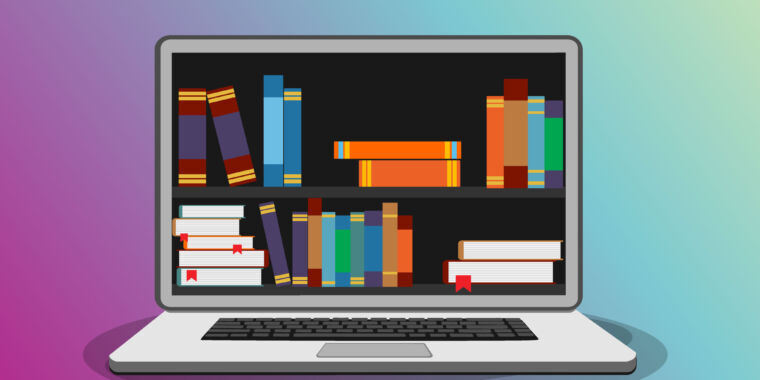- cross-posted to:
- [email protected]
- cross-posted to:
- [email protected]
In an open letter to publishers, more than 30,000 readers, researchers, and authors begged for access to the books to be restored in the open library, claiming the takedowns dealt “a serious blow to lower-income families, people with disabilities, rural communities, and LGBTQ+ people, among many others,” who may not have access to a local library or feel “safe accessing the information they need in public.”
During a press briefing following arguments in court Friday, IA founder Brewster Kahle said that “those voices weren’t being heard.” Judges appeared primarily focused on understanding how IA’s digital lending potentially hurts publishers’ profits in the ebook licensing market, rather than on how publishers’ costly ebook licensing potentially harms readers.



I understand your point. But the archive isn’t giving you a copy. It will display 2 pages on your screen, using encryption, for up to 2 hours. You can turn pages and see a different 2 pages displayed, but that’s it.
Is this a significant distinction from a copy, I don’t know. But it does seem different as I cannot take that copy, I can only observe content and even then in a limited way.
The Internet Archive had a system in place specifically to ensure that they had a legal license for each copy of the book loaded out digitally at any given time. This essentially made it a library.
During the lockdown, they intentionally stopped using this system and loaned out unlimited copies. They didn’t just violate copyright in accident, they willfully and intentionally disabled their own systems designed to preserve copyright.
I think the publishers suck too, but the Internet Archive humped the bunk on this one.
Yeah, I realize that. They waaaaay overstepped their rights on that one. But they are back to the original method.
They waited until they were sued to stop.
If you get caught speeding, the judge doesn’t throw out the ticket because you slowed down as the cop pulled you over.
They really brought attention to themselves. But if I understand it the current discussion is about if all books need to be removed, or can they have controlled lending.
Correct, the entire concept of physically backed digital lending is being threatened, and many physical libraries contracted with IA to digitize their books and then facilitate digitally lending their physical copies to their patrons
The encryption is literally entirely irrelevant.
The argument that a copy in your browser is legally defensible is the equivalent of claiming that sites can legally stream movies to you. It is a copy, both legally and in reality.
I can see where you are going with this. But there is NOT a copy in my browser. Only a representation of a fraction of the whole book at any given time. I cannot make a copy.
When I am viewing the section of the book, the rest of the book is “checked out”. No one else can look at it. Is this not how a library works? I check out an item, then I take it back? Are they not making the steps to make sure I can check it out, read it, and then I have to give it back?
Since libraries are allowed to loan from their collection, what makes digital any different? In the case of video, if the library wanted to check out a video and stream it to me, I see no difference than me checking it out myself. In fact libraries are granted the right to show videos to me and small groups, so why can’t I be farther away than in their building?
The current move of libraries to streaming services is exactly because of this. Now the library has a license, and cannot share the stream without the license. This is a move to remove physical items so that the possibility of streaming from a physical item is moot.
It doesn’t matter if the copy is all at once. Every bit of the file touching your computer involves multiple copies. It is fundamentally impossible to share any file without copies being made. The original digitization is already probably illegal because it’s for the purpose of distribution and not one of the fair use exceptions. Again, this is exactly identical to the claim that pirate sites providing streaming is legal.
Libraries do not make copies. Legally, it’s exactly that simple. There is no ambiguity in any way. It is copyright infringement under current law. It is not possible to defend this without throwing current law in the trash and starting over from scratch. If the judge did somehow rule in IA’s favor the Supreme Court could overrule him in about 30 seconds with basically no deliberation. Courts do not have the authority to change the law.